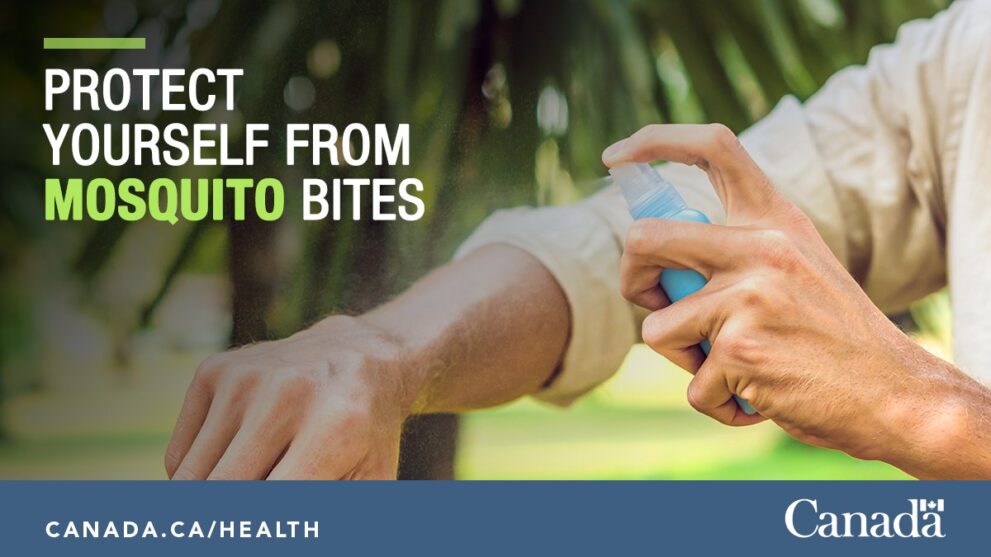Ottawa – Many diseases are spread by the bites of infected insects such as mosquitoes, ticks, fleas or flies. Learn how you can reduce your risk of infection and disease caused by bites, both at home and abroad.
Preventing and reducing bites
Use these tips to lower your risk of being bitten by disease-carrying insects.
Cover up
- Wear light-coloured, loose clothes made of tightly woven materials such as nylon or polyester.
- Wear long pants and tucked-in long-sleeved shirts with closed-toe shoes or boots and a hat.
- Tape the cuffs of your pants or tuck them inside your socks or shoes. This will provide extra protection against crawling insects like ticks.
- Adults can wear permethrin-treated clothing, which works by repelling mosquitoes.
Use insect repellent (bug spray) on exposed skin
- Always use an approved insect repellent. For best results, it is important to apply it properly.
Tips for applying insect repellent
- Do not spray repellent directly on your face.
- Do not apply to cuts, scrapes or irritated skin.
- Wash your hands after application and avoid contact with lips and eyes.
- Always read and follow product label directions to find out:
- when to re-apply; and
- whether the product is approved for children.
- Apply sunscreen before applying insect repellent.
Minimize exposure to insects
- Make sure indoor areas, especially sleeping areas, are completely enclosed or well-screened.
- Fix or replace old and torn screens in doors, windows and vents. Look for any other possible openings where insects can get in.
- Keep a flyswatter to kill insects as needed, when indoors.
- Use mosquito netting when sleeping outdoors or in a building that is not fully enclosed.
- Use mosquito netting to cover playpens and strollers. This will protect infants and very young children when outdoors or in a building that is not fully enclosed.
- Shower, change and wash clothing and gear after participating in outdoor activities.
- Check family members, pets and clothing for crawling insects (ticks) after engaging in outdoor activities. Higher risk activities include:
- camping
- hunting
- fishing
- hiking
- working outside
- participating in or watching outdoor sports
Travel-specific tips
- Visit a health care provider or travel health clinic at least 6 weeks before you travel. They may recommend vaccines or medications for further protection against diseases and illnesses spread by insects. This depends on your destination and planned activities (attending a conference in a hotel versus camping on a beach).
- Learn what types of insects are present where you are travelling, when they are most active and the symptoms of the diseases they spread.
- You can find this information by visiting the Travel Advice and Advisories page, and selecting your destination. Insect information is under the Health tab.
- Know peak biting times (time of day and season when most active).
- Find out where they can be found (indoors or outdoors, rural or urban).
- When travelling to areas where infected insects may be present, apply insect repellents as directed on the label.
- Avoid staying and sleeping in poorly built housing and structures, and minimize exposure outdoors.
When sleeping outdoors or staying in a building that is poorly built or is not completely enclosed:
- Use mosquito netting (bug net), tucked under the mattress
- Make sure screens and nets are intact (no rips or holes)
- Avoid touching the screen or mosquito netting (you could be bitten through the net)
- Use mosquito netting over cribs to protect infants and young children
Avoiding bedbugs, ticks and other pests while travelling
- Insects can easily hide in luggage, clothing, and other personal items.
- The most common insects that may try to sneak home with you are bedbugs and ticks:
- Bedbugs do not carry disease. They can be an annoyance because their bites may cause itching and loss of sleep, or an allergic reaction, which can be serious for some people.
- Ticks may try to sneak home with you on your body or your clothes. They are very small, and live in grassy, bushy and forested areas. Some tick bites can spread serious disease to people and their pets. Do a daily full body tick check on yourself, your children, your pets and your gear.
- Learn about the precautions you can take while travelling and upon your return to minimize the risk of transporting insects, such as bedbugs or ticks.








